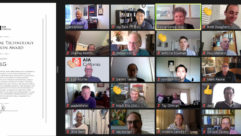American Institute of Architects (AIA)
Mar 25, 2010 11:01 AM
Location: National (Washington, D.C.)
and by state and locality
Website:www.aia.org and many related
websites for state and regional entities
Markets Served: All
Demographic: Architects and Allied
Professionals
AV Membership: Yes, as Allied
Members
Member Benefits: Vary at the local,
state, and national level
Key networking opportunity: Varies
at the local, state, and national level
Key events: Annual national conference
and expo, state conferences, and
market-specific conferences
Don’t miss: The chance to make
a presentation at one of the state
conferences or at more informal events
Want to meet architects? Consider becoming an allied
member of your local and/or state AIA component; for
some of you, a national allied membership may also be
appropriate. The key thing to understand about getting
involved with the AIA is that you can choose the scale
that works for you. For example, Steve Thorburn, a North
Carolina-based integrator, is involved with several local/
regional chapters, as well as the California state organization
and the national organization. The national AIA
website publishes a full directory that allows you to drill
down into the component organizations by state and chapter.
(It’s a great resource and exceedingly difficult to find.
From the aia.org home page, go to About>Organizational
Structure>State & Local Components, and then choose your
state.) From there, you can click through to the local and
state websites and determine where the opportunity looks
best for your business.
Leslie Williams, manager of
member and chapter services for
the AIA’s Texas state component—
The Texas Society of Architects
(TSA) in Austin—emphasizes that
a little research will help you choose
the best way to get involved. Texas
has 17 chapters in localities from
Abeline to Waco—some offer allied
memberships, some do not. The TSA
accepts allied members. (See www.
texasarchitect.org. On the left nav, go
to Member Benefits and click on the
link to Allied Members.)
“The chapters and states all
set their own fees and benefits,”
Williams explains, noting that for
some people, local chapter mixers
and benefits may be the best way
to network, while others may want
to take advantage of the state’s
annual conference and expo. Allied memberships to the
Texas organization are $250 for an individual or $625 for
corporate (three memberships). Benefits include access to
(and discounts on) the annual conference (held in October
in San Antonio, Texas) and all other events, a magazine
and newsletter, discounts on mailing labels that market
your membership, and a listing in an annual handbook
and membership directory that serves as a year-long reference
for member architects.
Like many AIA components, Texas solicits presentations
for its conference and expo (some states accept proposals from
non-members). If you’re an expert on green AV or on digital
signage design, you may want to develop a presentation and
submit it for consideration. Check the websites for submission
guidelines and deadlines. Educating architects and presenting
your expertise to that audience is at least as good an opportunity
as presenting to your peers.
Some AIA chapters also accept more
informal presentations throughout the
year—if your presentation is accepted,
it counts toward certification credits for
the architects who attend.
At the national level, in addition
to the national conference and
expo, you can take advantage of
market-specific communities and related
events held for markets including
justice, education, retail and
entertainment, residential, worship,
healthcare, and corporate. There
are committees for green, education,
design-build, and more as well
as a group devoted to small-project
practioners. Again, drilling down
is key to determine which of the
AIA Knowledge Communities and
Committees are the best networking
environment for you.









